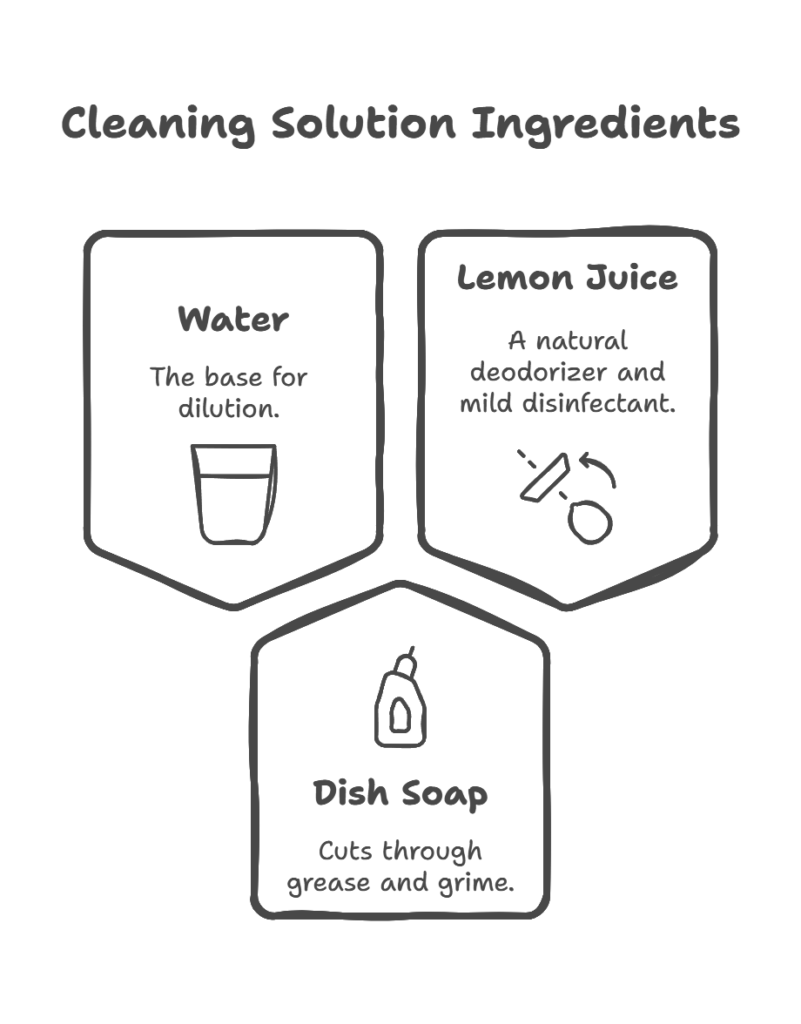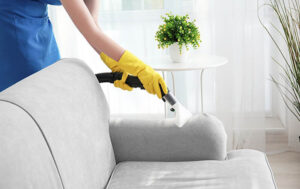Vinegar is a cleaning powerhouse—natural, antibacterial, and great at cutting through grime. But let’s be honest, not everyone loves that sharp smell. Plus, it’s not safe for every surface. If you have marble or certain stone floors, vinegar can actually cause damage over time.
Maybe you’re out of vinegar, or you just want a different option. No problem. There are plenty of white vinegar substitutes that work just as well. Whether you need something for everyday cleaning or a stronger option for tough messes, here are some solid alternatives. These alternatives are always utilized by house cleaning companies in Wilmington such as us!
Lemon Juice: A Fresh Alternative to Vinegar
If you’re looking for a vinegar substitute for cleaning that’s just as acidic but smells way better, lemon juice is a top choice.
- Cuts through grease – The natural acidity breaks down grime and stuck-on messes.
- Removes stains – Works on countertops, sinks, and even laundry.
- Sanitizes naturally – Helps kill bacteria and freshens up surfaces.
- Smells amazing – No harsh odors, just a light, citrusy scent.
You can use fresh lemon juice or bottled (just make sure it’s pure lemon juice, not lemonade). Mix it with water for an easy all-purpose spray or combine it with baking soda for extra scrubbing power.
Need more options? Keep going—there’s plenty more where that came from.
Scrubbing & Absorbent Alternatives: Removing Grime & Odors
Not every vinegar substitute for cleaning needs to be acidic—sometimes, you need a little grit to get the job done. If you’re dealing with tough grime, odors, or delicate surfaces that can’t handle vinegar, here are two solid options.
Baking Soda
When it comes to a white vinegar substitute, baking soda is one of the best. It’s alkaline, which makes it safe for surfaces that vinegar might damage, like marble. Plus, it’s a powerhouse for lifting dirt and neutralizing odors.
- Scrubs away grime – Works as a gentle abrasive to break down stuck-on messes.
- Neutralizes odors – Great for fridges, carpets, and even trash bins.
- Safe for sensitive surfaces – Unlike vinegar, it won’t damage natural stone.
- Versatile use – Mix with water for a cleaning paste or sprinkle it dry for deodorizing.
Looking for an easy boost? Mix baking soda and vinegar (if the surface allows) for a fizzy reaction that helps lift grime fast.
Cornstarch
Cornstarch might not be the first thing that comes to mind as a substitute for white vinegar, but it’s a game-changer for certain tasks. It’s especially useful for cleaning glass and freshening up fabrics.
- Polishes glass – Use it on windows, mirrors, and even stainless steel.
- Lifts stains from fabric – Works on rugs and carpets to absorb spills.
- Gentle but effective – Won’t scratch delicate surfaces.
Sprinkle cornstarch directly onto a stain, let it sit, then vacuum it up. For streak-free glass, mix it with water and wipe it down with a microfiber cloth.
Soapy & Disinfecting Alternatives: Grease Removal & Sanitization
Sometimes, you need more than just scrubbing power—you need something that cuts grease or kills germs. If vinegar isn’t an option, these alternatives get the job done.
Liquid Dish Soap
A simple mix of dish soap and water is one of the easiest ways to clean without vinegar. It’s gentle but tough on grease, making it perfect for everything from kitchen counters to bathroom sinks.
- Breaks down grease – Great for stovetops, cabinets, and dishes.
- No harsh residues – Just rinse with water, and you’re good to go.
- Works well with other ingredients – Combine with lemon juice for a fresh all-purpose cleaner.
Hydrogen Peroxide
If you need something stronger than vinegar for disinfecting, hydrogen peroxide is a great option. It’s more powerful against bacteria and viruses and works well for deep cleaning.
- Kills germs fast – More effective than vinegar at disinfecting surfaces.
- Safe for most surfaces – Use a 50/50 mix with water for cleaning.
- Great for cutting boards and bathrooms – Ideal for sanitizing high-touch areas.
Rubbing Alcohol (Isopropyl Alcohol)
For a quick-drying, streak-free disinfectant, rubbing alcohol is a solid choice. It’s especially useful for electronics and surfaces that need to be sanitized fast.
- Kills bacteria on contact – Nearly 100% effective against germs.
- No rinsing needed – Dries quickly without leaving residue.
- Perfect for electronics – Use on phones, keyboards, and remote controls.
Need an all-purpose spray? Mix rubbing alcohol and water in a spray bottle for a simple, no-fuss cleaner.
If vinegar isn’t the right fit, these alternatives give you the same cleaning power without the downsides. Whether you need to scrub, disinfect, or freshen up your space, there’s always a vinegar substitute for cleaning that works.
DIY All-Purpose Cleaner Recipe
Looking for a quick and effective vinegar substitute for cleaning? This simple DIY cleaner does the job without the strong smell of vinegar.
What You’ll Need:
- 2 cups of water – The base for dilution.
- 1 teaspoon of liquid dish soap – Cuts through grease and grime.
- 2 tablespoons of lemon juice – A natural deodorizer and mild disinfectant.

How to Use It:
- For everyday cleaning – Spray onto countertops, sinks, and other hard surfaces, then wipe clean.
- For tougher messes – Let it sit for a few minutes before scrubbing.
- For glass surfaces – Use a microfiber cloth for a streak-free shine.
This mix is a great substitute for white vinegar in all-purpose cleaning, leaving behind a fresh citrus scent instead of the usual vinegar odor. Want a more in-depth guide? Watch this video.
Environmental Considerations: Using & Disposing Cleaning Alternatives Responsibly
Even natural cleaners can have an impact on the environment, especially when washed down the drain. Whether you’re using baking soda and vinegar, lemon juice, or hydrogen peroxide, here’s how to keep your cleaning routine eco-friendly.
- Use products sparingly – A little goes a long way. Overuse can harm aquatic life.
- Avoid dumping strong solutions – Let water dilute any leftover cleaner before disposal.
- Choose the right alternative – Some cleaners work better on certain surfaces. For example:
- Baking soda is great for scrubbing but not for sanitizing.
- Rubbing alcohol disinfects but isn’t the best for everyday cleaning.
- Lemon juice is a great degreaser but needs rinsing on sensitive surfaces.
By picking the right cleaner for the job, you reduce waste and make sure your home stays clean without unnecessary chemicals. For More info we love this guide from Shapiroe.
Conclusion
Finding a vinegar substitute for cleaning is easy once you know what works. Whether it’s lemon juice for stain removal, baking soda for scrubbing, or hydrogen peroxide for disinfecting, there’s a solution for every mess.
Switching things up isn’t just about preference—it’s about choosing the right tool for the job while keeping things safe for your home and the environment. So next time you need a white vinegar substitute, try one of these natural alternatives and enjoy a fresh, effective clean.
FAQs: Vinegar Substitute for Cleaning
1. What can I use as a vinegar substitute for cleaning?
You can swap vinegar for lemon juice, baking soda, hydrogen peroxide, dish soap, or rubbing alcohol—depending on the surface and cleaning task. Lemon juice works well for degreasing, while baking soda is great for scrubbing.
2. Is baking soda a good substitute for white vinegar?
Yes, but it works differently. Baking soda is alkaline, so it’s better for scrubbing and deodorizing, while vinegar is acidic, making it better for dissolving mineral deposits.
3. Can I mix baking soda and vinegar for cleaning?
Yes, but only for certain tasks. The reaction creates a fizzy effect that helps lift grime, but the two ingredients cancel each other out, so it’s not great for long-term cleaning solutions.
4. What’s the best natural disinfectant if I can’t use vinegar?
Hydrogen peroxide and rubbing alcohol are both stronger disinfectants than vinegar. Use hydrogen peroxide for surfaces like cutting boards and bathrooms, and rubbing alcohol for quick sanitizing on electronics and high-touch areas.
5. What’s the best substitute for white vinegar in all-purpose cleaning?
A mix of water, dish soap, and lemon juice makes a great all-purpose cleaner without the strong vinegar smell. It’s safe, effective, and fresh-smelling.
6. Can I use lemon juice instead of vinegar?
Yes! Lemon juice is acidic like vinegar, making it great for cutting grease and removing stains. It also leaves a fresh citrus scent, which many people prefer over vinegar’s strong odor.
7. Is cornstarch a good cleaner?
It is! Cornstarch works well for polishing glass, absorbing spills, and removing stains from rugs and carpets. It’s a gentle, non-abrasive alternative to vinegar-based cleaners.
8. Are vinegar alternatives safe for pets?
Most natural cleaners like baking soda, lemon juice, and hydrogen peroxide are pet-friendly when used properly. Avoid essential oils and strong chemical disinfectants that could be harmful.
9. What’s the safest cleaner for marble and stone surfaces?
Baking soda and dish soap are both safe for marble and natural stone. Vinegar and lemon juice can etch and damage stone surfaces over time, so avoid anything acidic.
10. What’s the best way to make a streak-free glass cleaner without vinegar?
Mix water, cornstarch, and a few drops of dish soap for a simple glass cleaner that won’t leave streaks. Use a microfiber cloth for the best results.
Recommended Next Post: How to Clean a House Quickly and Effectively.







